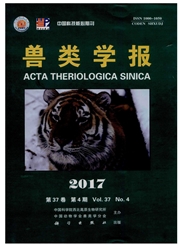

 中文摘要:
中文摘要:
布氏田鼠是我国内蒙古草原的主要害鼠之一,具有明显的季节繁殖特征,不同季节出生个体可能具有不同的繁殖发育策略,但尚缺乏内分泌证据支持。本研究采用标志重捕法,连续监测大型自然围栏中不同年龄雄性布氏田鼠的繁殖状态和应激水平的季节变化,分析各年龄组雄鼠的繁殖发育策略。结果表明,越冬雄鼠可保持较高的睾丸下降率和睾酮水平至8月初;而部分5月生雄鼠的繁殖期睾酮水平较接近越冬鼠,8月初降至年内最低水平,而6月及以后出生雄鼠睾酮始终处于较低水平;这说明越冬鼠的繁殖状态可贯穿繁殖期始终,只有部分5月生雄鼠可能参与当年繁殖,而6月及以后出生雄鼠则不能在当年繁殖。越冬鼠皮质醇水平高于当年鼠,繁殖期高于非繁殖期,这可能是越冬鼠由于繁殖需要而保持较高应激状态,从而造成繁殖盛期后死亡率升高。这些结果说明,不同时期出生的雄性布氏田鼠具有不同的出生后性腺发育模式和繁殖策略,反映出生存与繁殖之间的权衡。
 英文摘要:
英文摘要:
Brandt' s vole (Lasiopodomys brandtii), a seasonal breeder, is one of major rodent pests in Inner Mongolia grasslands. In previous literature, voles born in different seasons may have different reproductive strategies, but there is still a lack of endocrine evidence. In present study, using a mark-recapture method, we successively measured the testicu-lar descent ratios and chronic variations of fecal testosterone and cortisol levels of male voles born in different seasons, and then analyzed their seasonal changes in reproductive activity in natural enclosure. Our results showed that higher testicular descent ratio and higher testosterone levels of overwintered voles could be maintained until early August; in newborn male voles, only some of the males born in May had a similar testosterone level in the breeding season, while those that were born after June did not develop their gonads in their birth year. Those results indicate that overwintered males could breed throughout the whole breeding season; some of the early born males possibly took part in breeding, while those born after June could not breed until the next breeding season. Moreover, higher cortisol levels were found in overwintered male voles, especially in breeding season, which suggested that overwintered males have higher reproductive effort which caused a high stress level and mortality in breeding season. These results suggested that male voles born in different seasons have different patterns of gonadal development and reproductive strategies, which are related to their life-span expectation and imply the balance between existence and reproduction.
 同期刊论文项目
同期刊论文项目
 同项目期刊论文
同项目期刊论文
 期刊信息
期刊信息
